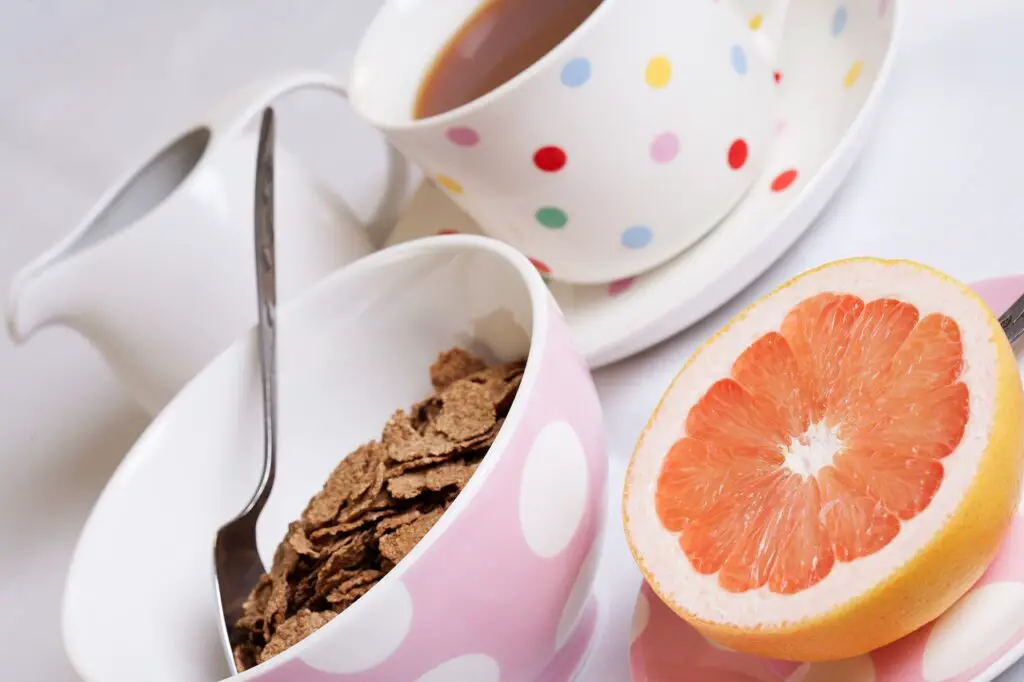We’ve said it before: we’re big fans of breakfast cereal. There are always open boxes in our cupboards. We revealed in our last post that our dog likes Weetabix and that sometimes we also let him slurp up the last few shreddies left in the bowl. However, the more we read the more we realised that these treats should be infrequent and not a replacement for more suitable dog snacks. Keeping it on a breakfast-based theme, we’ve turned our attention to another much-loved cereal to find out if dogs can eat Bran Flakes.
What’s in Bran Flakes?
Bran flakes are small toasted pieces of wheat or oat bran. Kellogg’s make and sell Bran Flakes but you’ll also find several variations made by other manufacturers.
Looking at Bran Flakes in the UK, the ingredients are Wholewheat (59%), wheat bran (18%), wholewheat flour, sugar, barley malt extract, glucose syrup, salt, natural flavouring. Added vitamins and minerals include Niacin, iron, vitamin B6, riboflavin, thiamin, folic acid, vitamin D, vitamin B12.
Can Dogs Eat Bran Flakes?
There’s nothing that’s immediately concerning about this cereal. There are no toxic ingredients to endanger a dog’s health if they eat Bran Flakes. Of course, if your dog is grain intolerant then you should entirely avoid Bran Flakes as eating cereal will make them ill. Three ingredients do cause some concern, however, and should not regularly feature in a dog’s diet: sugar, glucose syrup, and salt.
Sugar and glucose syrup are not good for dogs. They’re high in calories and offer no nutritional benefit to the dog. Too much sugar causes dental issues in dogs and can lead to expensive veterinary bills later in your pet’s life. Sugar can also contribute to chronic health issues in the future such as diabetes and heart disease. Consuming high levels of calories will also make it much harder to manage a dog’s weight which can have wider health implications as they get older. The added salt is a concern, too. Dogs do need salt in their diet but this will be catered for in the dog food you’re already giving them. Too much salt is bad for the dog’s health.
Bottom Line:
Dogs can eat Bran Flakes in small amounts as a treat. There’s nothing that’s going to cause them any short-term issues (aside from an upset stomach if your dog is grain-sensitive) but be careful about giving them to your dog too regularly. Don’t add any additional sugar to them. Some dogs have a problem digesting milk so soften them in water. If your dog has never had them before, then only give them a very small amount as it may result in an upset stomach.
Be careful of similar cereals with a slightly different name as each manufacturer will have a different set of ingredients. You should also stick to plain Bran Flakes. Sometimes, a new variety is released and these may have ingredients that are bad for our dogs. For example, raisins are a popular addition in some cereals but are toxic to dogs.
Some owners use Bran Flakes to increase fibre in their dog’s diet. We’d recommend speaking with your veterinarian or someone who has experience in dog nutrition. There will be other options that may be more suitable and more successful in treating low-fibre diets without the risk of adding extra sugar and salt to a dog’s diet.
One of the reasons we were relieved that dogs can eat Bran Flakes wasn’t because we want to feed him any, but just for peace of mind that when we catch him with his head in our bowl that he’s not in any serious medical danger. It’s so easy to be complacent and some human foods contain preservatives or ingredients that can do serious harm to our dogs. Whilst we won’t be adding bran flakes to our dog’s diet, it’s a relief to know it’s ok in small doses.
One thing to be careful about if you do leave food out is dog bloat. We’d been pretty naïve on the subject until we did some research about dogs eating loaves of bread and developing the condition and some have even died from it.
Human foods can be harmful for dogs and it’s important as owners we don’t become complacent.


